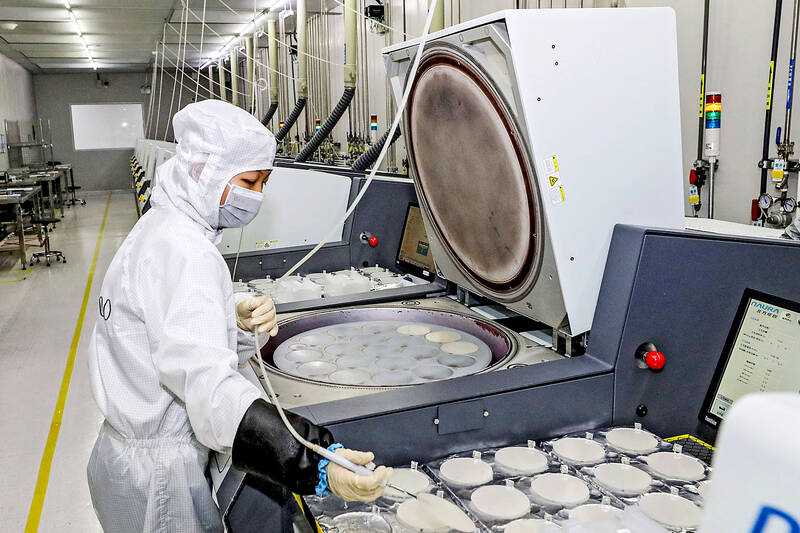China has claimed a breakthrough in developing homegrown chipmaking equipment, an important step in overcoming US sanctions designed to thwart Beijing’s semiconductor goals.
State-linked organizations are advised to use a new laser-based immersion lithography machine with a resolution of 65 nanometers or better, the Chinese Ministry of Industry and Information Technology (MIIT) said in an announcement this month.
Although the note does not specify the supplier, the spec marks a significant step up from the previous most advanced indigenous equipment — developed by Shanghai Micro Electronics Equipment Group Co (SMEE, 上海微電子) — which stood at about 90 nanometers.

Photo: AFP
MIIT’s claimed advances last week suggest that homegrown Chinese companies are beginning to make headway in developing more sophisticated machines, although SMEE and its peers have a long way to go to catch the likes of ASML Holding NV.
The resolution of the gear determines the scale at which integrated circuits can be imprinted onto silicon, and ASML’s best lithography machines now have a resolution of about 8 nanometers.
One approach to improve the density of transistors is etching lower-resolution patterns multiple times, as used by Huawei Technologies Co (華為), which helps narrow the gap.
Still, the US-led trade campaign to limit China’s access to advanced chipmaking equipment has stifled its competitiveness in developing nascent technologies such as artificial intelligence, which require the most advanced semiconductors.
In its note, the MIIT also named a slew of additional home-developed chip-related gear it wanted to see put into wider use, including oxidation furnaces and dry-etching gear.
SMEE has developed a lithography machine that can be used to make 28-nanometer chips, key state backer Zhangjiang Group (張江集團) declared last year.
However, it is unclear whether that machine has gone into production and how it relates to last week’s notice from the MIIT.
While it is widely believed that China would struggle to move far beyond its current level of sophistication — as exemplified by Huawei’s 7-nanometer Kirin mobile chip introduced a year ago — the lack of transparency has elicited concern in Washington about the effectiveness of its sweeping export controls on China and pressing the Netherlands for tighter restrictions on ASML’s China business.
China relies on ASML’s immersion deep ultraviolet lithography systems to advance its chipmaking technology, as the country has not yet been able to develop similarly capable equipment, but under US pressure, ASML is now barred from shipping to China.

NEW IDENTITY: Known for its software, India has expanded into hardware, with its semiconductor industry growing from US$38bn in 2023 to US$45bn to US$50bn India on Saturday inaugurated its first semiconductor assembly and test facility, a milestone in the government’s push to reduce dependence on foreign chipmakers and stake a claim in a sector dominated by China. Indian Prime Minister Narendra Modi opened US firm Micron Technology Inc’s semiconductor assembly, test and packaging unit in his home state of Gujarat, hailing the “dawn of a new era” for India’s technology ambitions. “When young Indians look back in the future, they will see this decade as the turning point in our tech future,” Modi told the event, which was broadcast on his YouTube channel. The plant would convert

‘SEISMIC SHIFT’: The researcher forecast there would be about 1.1 billion mobile shipments this year, down from 1.26 billion the prior year and erasing years of gains The global smartphone market is expected to contract 12.9 percent this year due to the unprecedented memorychip shortage, marking “a crisis like no other,” researcher International Data Corp (IDC) said. The new forecast, a dramatic revision down from earlier estimates, gives the latest accounting of the ongoing memory crunch that is affecting every corner of the electronics industry. The demand for advanced memory to power artificial intelligence (AI) tasks has drained global supply until well into next year and jeopardizes the business model of many smartphone makers. IDC forecast about 1.1 billion mobile shipments this year, down from 1.26 billion the prior

People stand in a Pokemon store in Tokyo on Thursday. One of the world highest-grossing franchises is celebrated its 30th anniversary yesterday.

Zimbabwe’s ban on raw lithium exports is forcing Chinese miners to rethink their strategy, speeding up plans to process the metal locally instead of shipping it to China’s vast rechargeable battery industry. The country is Africa’s largest lithium producer and has one of the world’s largest reserves, according to the US Geological Survey (USGS). Zimbabwe already banned the export of lithium ore in 2022 and last year announced it would halt exports of lithium concentrates from January next year. However, on Wednesday it imposed the ban with immediate effect, leaving unclear what the lithium mining sector would do in the